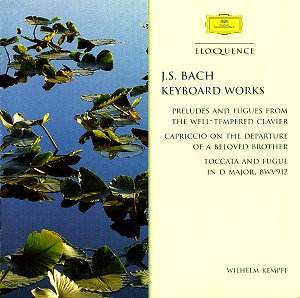One of the highlights of Angel Hewitt’s recent Bach
transcription album was to rediscover those of Wilhelm Kempff. Hewitt,
maybe the greatest Bach pianist of our day, paid eloquent tribute to
a man who had begun as an organist and was, as befits a musician of
his generation, a composer-pianist of the kind now almost extinct. To
encounter his transcriptions was to be reminded of his greatness and
to listen to this disc is to encounter it once again.
We have lived through the puritanical prescriptiveness
of the more doctrinaire early music enthusiasts – whose attractive speculations
are as chimerical as any other belief – and twenty five years later
we can listen to a great pianist unfolding effortlessly eventful and
thoughtful mediations of Chorale Preludes and much else. In Nun komm’
Der Heiden Heiland we open with Kempff’s nobility, a gravity distilled
of wisdom and tact. In the second Es ist gewisslich we can hear
the subtlety and finesse of his left hand as it propels the noble melody.
There is real amplitude in Befiehl du deine Wege without extraneous
melodic impositions. Kempff’s transcription of Jesu joy of man’s
desiring differs from Myra Hess’ quite significantly in ethos. An
increasingly active left hand becomes more emphatic, tiered sonorities
become distinctly aggressive and near the concluding modulation distinctive
organ sonorities are disclosed in Kempff’s playing. The effect is rather
unusual, rather like seeing a benign old friend suddenly go beetroot
red in anger. Fascinating is Kempff’s clanging bell filled Wir danken
dir in which celebration is mixed with praise. Wachet auf is
a particular example of a wider principle. In other transcriptions pianists
are much more inclined to emphasise the individual but disruptive left
hand melody; listen for example to Busoni’s transcription for the full
weight of conjunction and clash to be apparent. Kempff however isn’t
interested; his transcription instead emphasises integration, wholeness
and the confluence of left and right hand. Comparison with Egon Petri’s
1930s recording of the Bach-Busoni transcriptions shows that Kempff’s
transcription is not only slower and less dramatic but that he has simplified,
modified and subsumed Busoni’s creative clashes into an altogether simpler
setting. Where Busoni is exultant Kempff is contemplative.
Elsewhere I admired the plangency and depth of tone
in the Largo from the harpsichord Concerto and the very romantic
and caressing Handel with its naughtily rolled bass. In the Gluck we
find Kempff’s left hand rather busy and his right hand bejewelled, spinning
the melody with not unforced tact. Not preferable to Petri’s limpidity
and unassuming beauty but interesting to hear. There is also the not
inconsiderable addition of the two suites, the English Suite No 3 and
the French Suite No 5. Here Kempff shows crisp articulation, not over
bright, never metronomic, and always gently expressive. In the Courante
of the English Suite he is precise, athletic and quietly determined.
In the second Sarabande he is moving without artifice and maintains
proper depth of tone and clarity between hands. Listen also to the perfectly
graded little stabbing left hand in the succeeding first Gavotte
– unforced wit.
Twenty-five years have passed since Kempff recorded
these pieces but time has done nothing to efface his playing. Indeed
his stature seems only to increase and this CD, filled to the brim,
gives many indications as to why he has valuably cogent things to say
about Bach, transcriptions or otherwise.
Jonathan Woolf
AVAILABILITY
www.buywell.com


